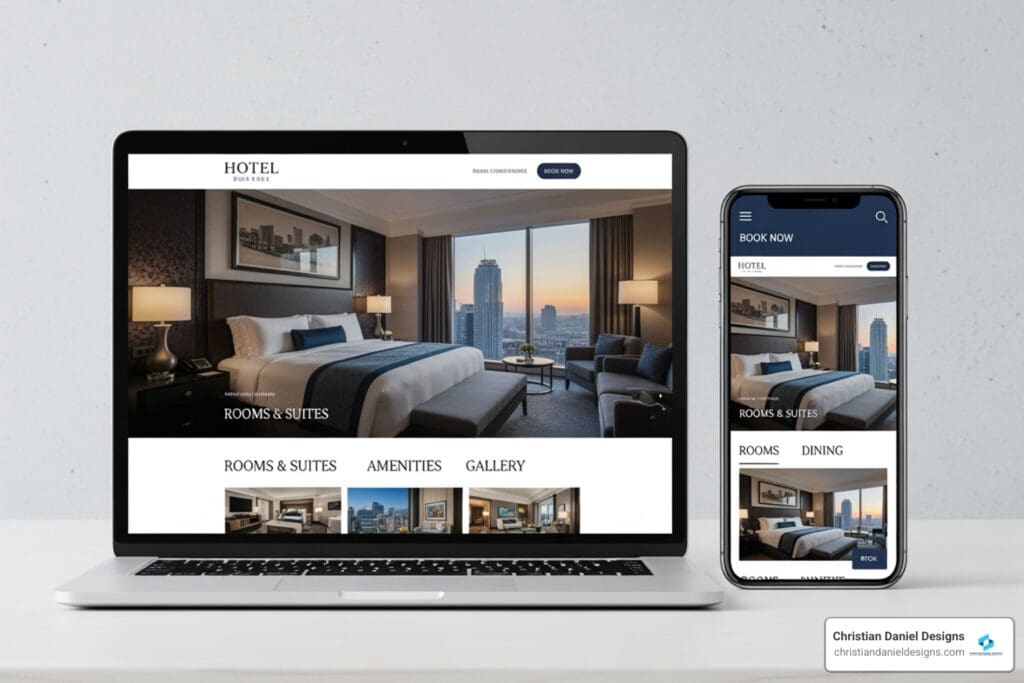Why Your Hotel’s Digital Front Door Matters More Than Ever
Hotel website development is the process of creating a digital platform that serves as your property’s virtual welcome mat. It showcases your brand, engages potential guests, and converts visitors into paying customers. It’s not just about having a website; it’s about building a revenue-generating tool that reduces reliance on third-party booking platforms and puts you in direct control of your guest relationships.
Effective hotel websites combine high-quality visuals, an integrated booking engine, a mobile-responsive design, SEO-optimized content, and clear calls-to-action. These elements work together to create a direct path to booking that converts browsers into guests.
Here’s a reality check: over 50% of travelers look at a property’s website before making a reservation. Your website isn’t just a digital brochure—it’s your most powerful sales tool. Yet many hotels have slow, outdated sites that frustrate guests and send them straight to OTAs. A mobile page that takes 6 seconds to load can increase bounce rates by 106% compared to one that loads in 1 second. That’s bookings walking out your digital door.
The good news? Hotels that get this right see dramatic results. One resort saw a 525% increase in direct website bookings after a redesign. Your website should inspire travel, broadcast your unique story, and make booking effortless.
I’m Christian Daniel, and I’ve spent over two decades crafting custom digital experiences for hospitality brands, including award-winning work for properties like The Plaza Hotel and Park Hyatt Chicago. Throughout my career in hotel website development, I’ve seen how a well-designed site transforms a property’s bottom line—and I’m here to guide you through the process.
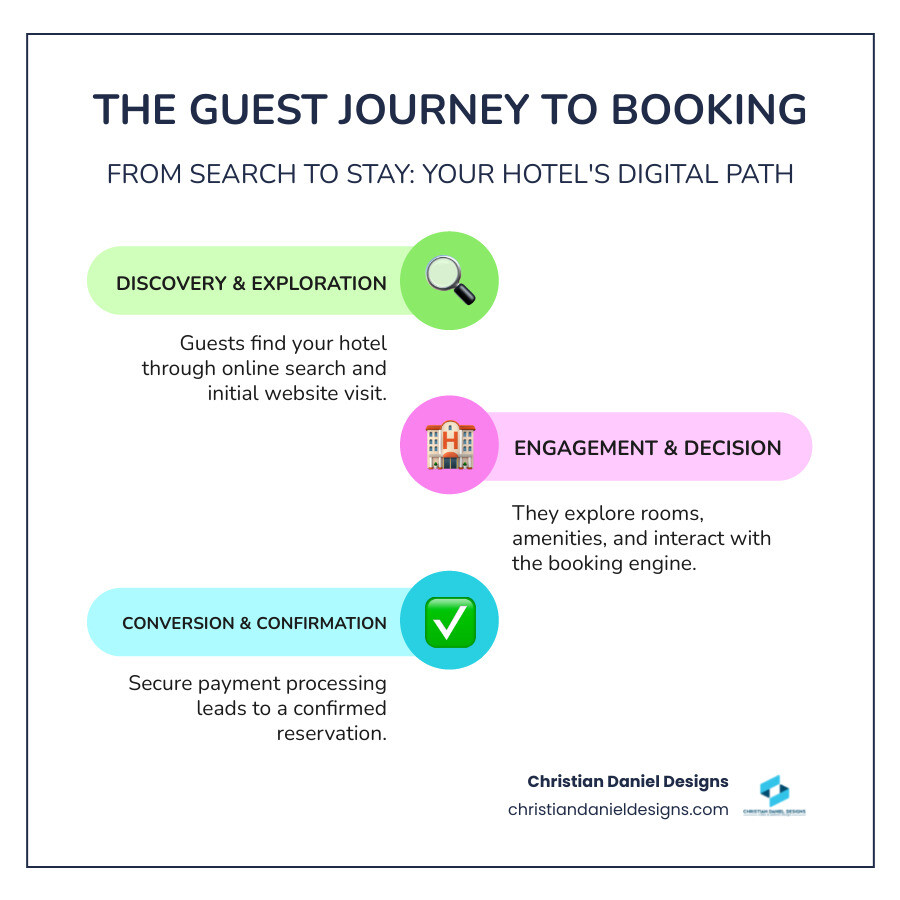
The Blueprint for Bookings: Essential Website Components
Think of your hotel website as a digital lobby. Just like your physical entrance sets the tone, your website creates that crucial first impression online. When I work on hotel website development projects, I approach each site with this mindset: every element needs to invite, inform, and inspire action.
An effective hotel website guides visitors from curiosity to confirmed reservation. The difference between a site that converts and one that sends guests to an OTA often comes down to having the right components working together seamlessly.
Professional photography is where it starts. Your rooms, common areas, and amenities need to shine through appealing pictures that help guests visualize their stay. But don’t stop at still photos—video tours have become increasingly powerful, bringing your property to life in ways static images can’t. Great visual storytelling can be transformative.
An integrated booking engine is your conversion workhorse. This means real-time availability, transparent pricing, and secure payment processing—all working smoothly without sending guests to another site. The path from “I’m interested” to “I’m booked” must feel effortless.
Clear calls-to-action guide the journey. Buttons like “Book Now” or “Check Availability” should be prominent and intuitive, so guests never have to hunt for the next step.
Easy navigation ensures visitors find what they’re looking for without frustration. Key information should be accessible in two clicks or less.
Your room and rates pages deserve special attention. Each room type should have its own page with multiple photos, detailed descriptions, and a complete list of amenities.
The amenities showcase is where you highlight what makes your property special. That luxurious spa, award-winning restaurant, or stunning rooftop pool? Show them off with great visuals and compelling descriptions.
Finally, local content rounds out the picture. Guests are booking an experience in your destination. Information about local attractions, events, and neighborhood gems helps them envision their entire trip.
For more insights, check out my guide on Characteristics of a Good Hospitality Website Design. Strategic design is about understanding what converts browsers into bookers.
Integrating a High-Conversion Booking Engine
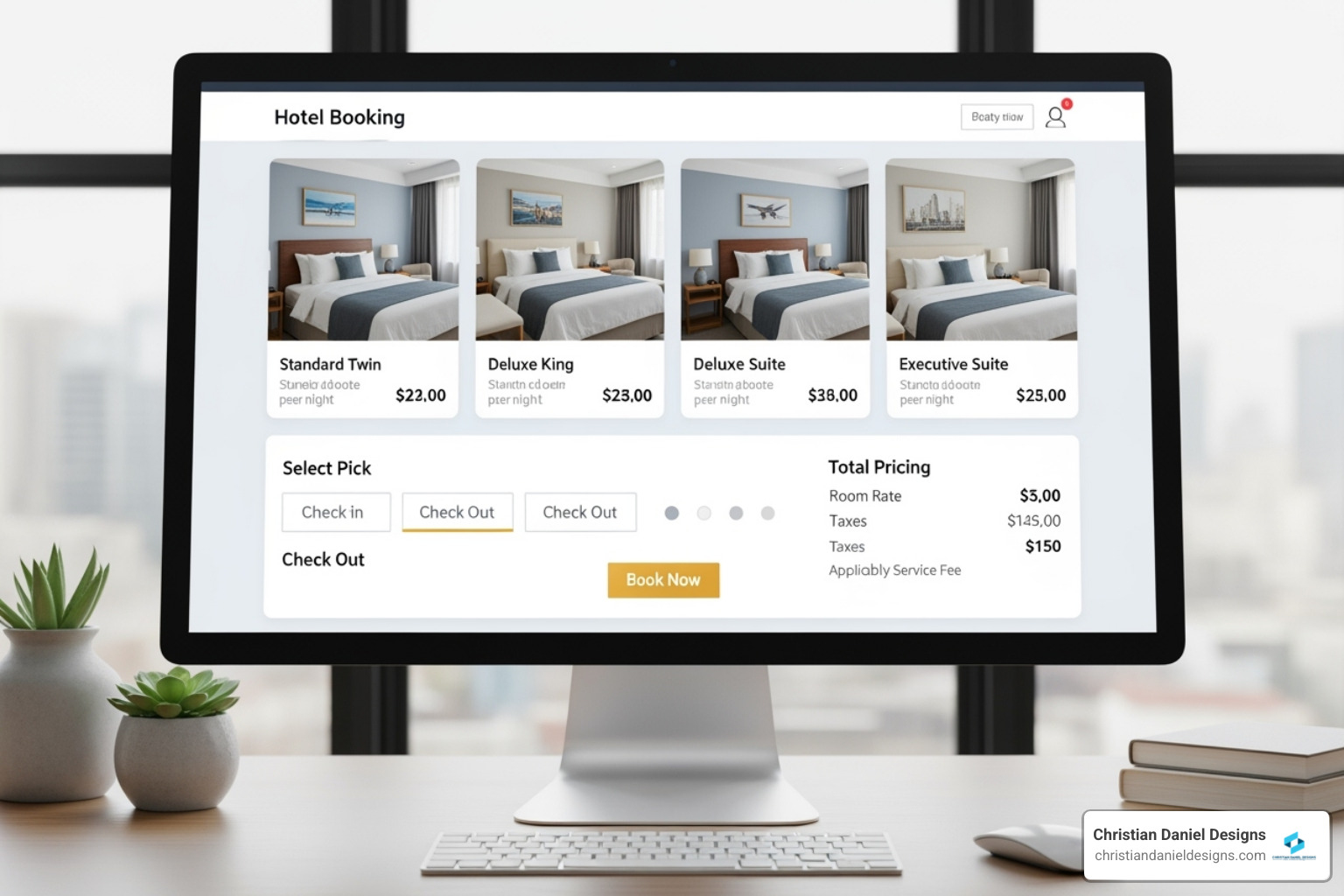
A beautiful website without a robust booking engine is like a hotel with a locked front door. The entire purpose of hotel website development is to drive direct bookings, and your booking engine is the tool that makes it happen.
A well-integrated booking engine creates a direct revenue channel that keeps more money in your pocket. Every booking made through your site means you’re not paying the hefty 15-25% commission that OTAs charge. For example, some properties see a 20% increase in revenue from direct bookings in less than a year after improving their direct booking platform.
Reducing OTA commissions isn’t just about saving money—it’s about taking control of your guest relationships. When someone books directly, you own that connection from the start.
Smart booking engines also create upselling opportunities right at the point of purchase, allowing guests to upgrade a room or add a spa package during the booking process. This increases your average booking value with minimal effort.
You also get complete control over promotions and packages. You can run a last-minute special or create an exclusive “book direct” discount without waiting for OTA approval.
Leading booking platforms are built to maximize conversions and build guest loyalty. They understand a crucial point: an efficient booking journey with fewer steps leads to faster conversions. The smoother the process, the less time guests have to second-guess their decision or compare prices elsewhere.
Visual Storytelling: Photography and Video
Photography and video are the secret weapons of effective hotel website development. Your visuals need to do more than show your property; they need to make people feel something.
Captivating guests starts with high-quality imagery that stops the scroll. When someone lands on your site, they should immediately see images that make them curious and eager to explore. I work with properties to ensure every photo evokes emotion—whether that’s excitement, relaxation, or wanderlust.
Showcasing unique features is where you differentiate yourself. Maybe it’s your historic architecture, modern design, or serene landscape. These distinctive elements deserve to be highlighted prominently.
Room views and lifestyle imagery help potential guests picture themselves at your property. Don’t just show an empty bed—show the morning light streaming through the window or a couple enjoying coffee on the balcony. These shots create an emotional connection that room specs alone never will.
Video tours take this even further, and some booking engines even allow video integration to increase conversions and encourage upselling. Videos can also be coded with meta and schema data to provide SEO benefits on top of the engagement boost.
Drone footage has become popular for properties with impressive exteriors. An aerial view of your beachfront location or mountain setting can be absolutely stunning.
When I create Custom Hotel Websites, the visual strategy is always front and center. It’s about creating a narrative that guides guests through your property and makes them see themselves there. That emotional connection is what turns a casual browser into a confirmed booking.
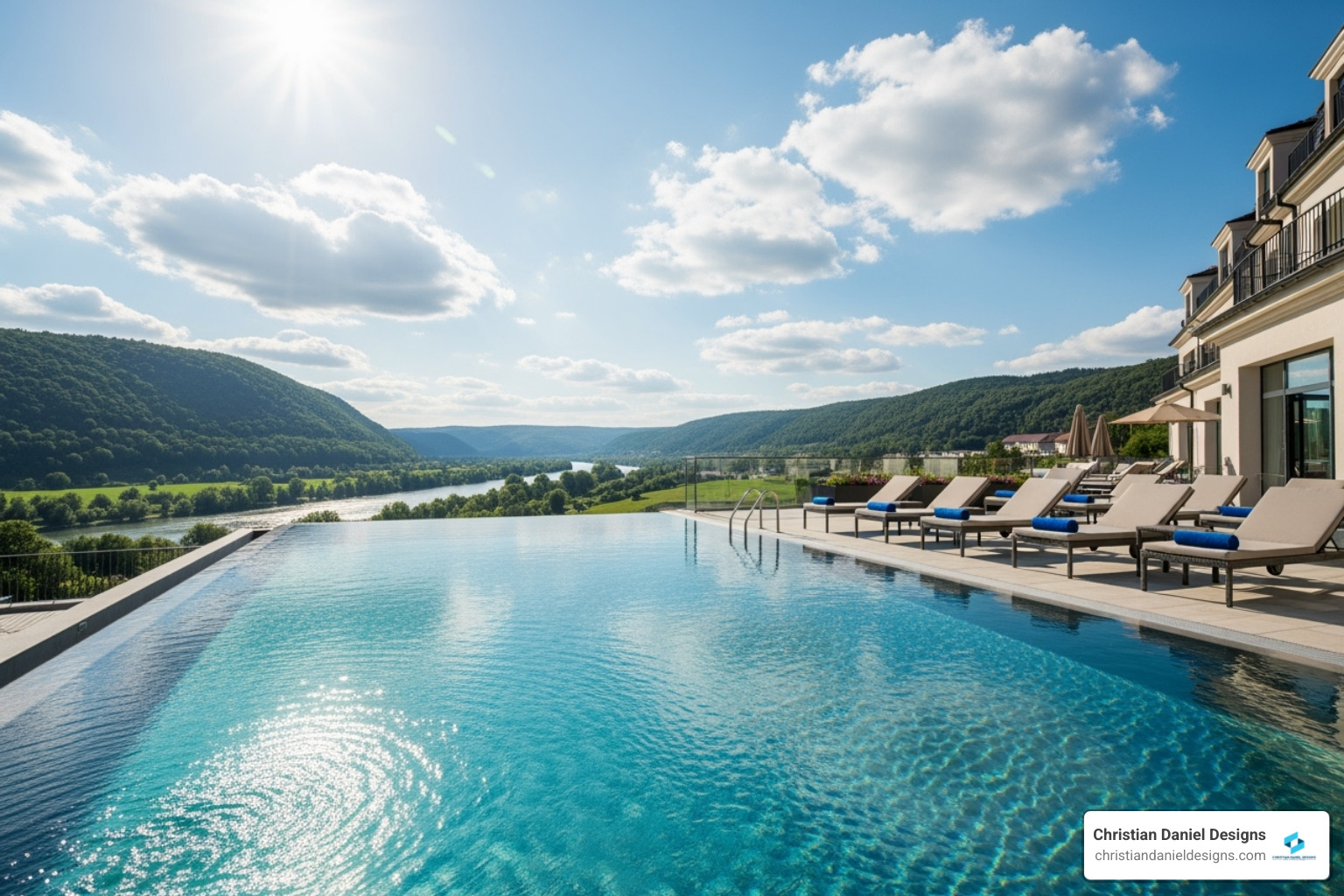
Performance is Paramount: Speed, Mobile, and User Experience
After 20+ years in web design, I’ve learned that a gorgeous website that loads slowly is like a five-star hotel with a broken elevator. It looks amazing, but guests won’t stick around.
In hotel website development, performance is the foundation of everything. User engagement, bounce rates, and conversions all depend on how your site performs. I’ve seen beautiful designs fail because they took too long to load, and simpler sites succeed because they were lightning-fast.
When I build a site, I’m obsessed with user experience (UX). That means easy navigation, clear visibility of what matters most, and accessibility for everyone—including ADA compliance for users with disabilities. These aren’t optional extras; they’re essentials. The [Ultimate Hospitality Web Design Guide](https://christiandanieldesigns.com/2025/10/ultimate-hospitality-web-design-guide/) explores these principles in depth, and I build them into every project.
The Need for Speed: Why Loading Time Matters
Let me be blunt: a slow website is costing you bookings. I’ve watched too many hotel owners lose potential guests because their site crawled.
User patience online is measured in seconds. Google’s research found that a mobile page taking just 6 seconds to load will increase bounce rates by 106% compared to a page that loads in 1 second. You’re losing more than half your potential guests before they even see your property. That’s a revenue problem.
[According to Google research](https://www.thinkwithgoogle.com/marketing-strategies/app-and-mobile/mobile-page-speed-new-industry-benchmarks/), speed is also a Google ranking factor. Slow sites get pushed down in search results, making you harder to find. The main culprits are often unoptimized images, inefficient code, and a lack of proper caching.

When I develop a hotel website, image optimization is non-negotiable. I compress every visual without sacrificing quality, implement smart caching strategies, and write clean, efficient code. Every millisecond matters. A fast site isn’t a luxury—it’s the difference between a guest booking with you or clicking over to an OTA.
Mobile-First Hotel Website Development
If your site doesn’t work beautifully on mobile, you’re turning away more than half your potential guests. The days of mobile as an afterthought are long gone.
The numbers are staggering: [mobile traffic to hotel websites increased 6 percent](https://www.hotelnewsresource.com/article111407.html) in one recent year, with mobile revenue jumping significantly. Your guests are researching and booking from their phones. If your site doesn’t work flawlessly for them, they’ll book somewhere that does.
Mobile-first design means I start every project by designing for smartphones first, then scale up. This isn’t about shrinking your desktop site—it’s about rethinking the experience for mobile users. They need simplified navigation, larger tap targets, and a booking process that doesn’t require zooming or pinching.
Responsive layouts automatically adjust to any screen size, ensuring your site looks great everywhere. I also include click-to-call buttons so guests can reach you with a single tap.
When I approach [Web Design for Hospitality](https://christiandanieldesigns.com/2025/10/web-design-for-hospitality/), mobile isn’t an afterthought—it’s the starting point. Because if it works perfectly on a smartphone, it’ll shine everywhere else. That’s how you turn mobile browsers into confirmed bookings.
Crafting Your Digital Story: The Core of Hotel Website Development
Beyond the technical features, the true heart of hotel website development is storytelling. Your website needs to communicate who you are and why guests should choose you.
Every hotel has a story. Maybe you’re a historic boutique property, a modern eco-resort, or a family-run inn. Whatever makes your property unique, your website needs to broadcast that brand identity loud and clear. This is where your unique selling propositions (USPs) come into play. Your website should highlight these differentiators in a way that resonates emotionally with potential guests.
I always think about guest expectations when designing a site. A luxury hotel needs to evoke opulence, while a family-friendly resort should feel fun and welcoming. The design, copy, and visuals all work together to create the desired mood, helping guests fall in love with your property before they arrive.
This is exactly what I focus on with my [Hospitality Branding Solutions](https://christiandanieldesigns.com/2025/10/hospitality-branding-solutions/)—creating a cohesive narrative that guides visitors toward booking.
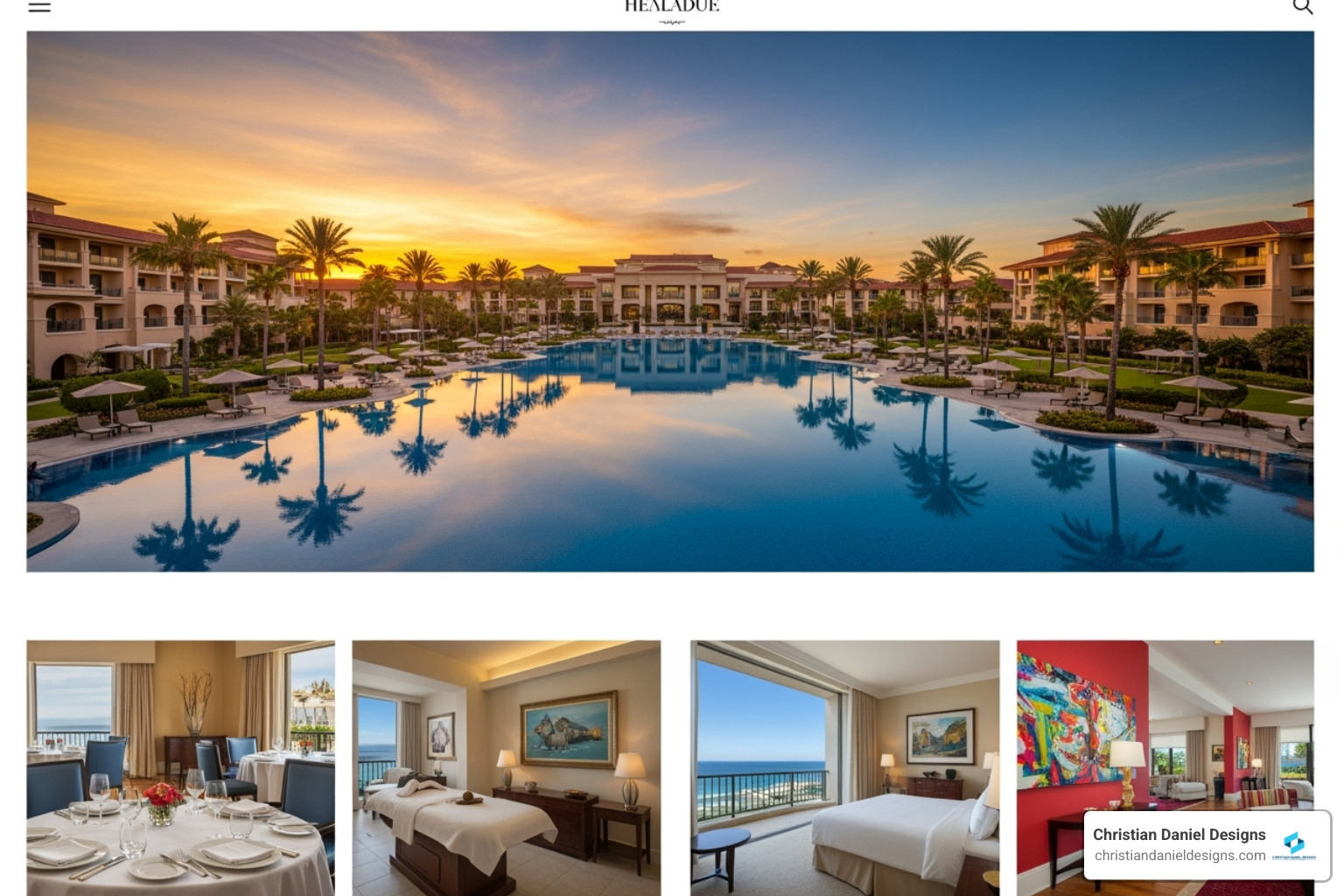
Leveraging Local Content and Guest Reviews
Guests aren’t just booking a room; they’re booking an experience. That’s why incorporating local content into every hotel website is so important.
By providing rich local information on your site, you answer travelers’ questions before they’re asked. I recommend creating local area guides that highlight nearby attractions and share hidden gems—like a great local restaurant or a scenic hiking trail. An event calendar can also be a powerful tool, helping guests see what’s happening during their potential stay.
What really seals the deal is guest reviews. Potential guests trust the experiences of previous visitors more than any marketing copy. Displaying testimonials prominently and integrating Tripadvisor widgets or similar review platforms provides social proof and builds trust instantly. When someone sees that previous guests raved about your property, it carries real weight.
This local content also significantly boosts your SEO. By incorporating local keywords, you’ll rank higher for location-based searches, driving more qualified traffic to your site. I cover these strategies in my [Best Hotel Web Design Guide 2025](https://christiandanieldesigns.com/2025/10/best-hotel-web-design-guide-2025/).
Key Features of Effective Hotel Website Development Services
When hotel owners reach out to me, they’re looking for a partner who understands the hospitality business and can build a website that performs.
First and foremost is hospitality expertise. Designing for a hotel is different from other industries; you need to understand traveler psychology and booking patterns. I’ve spent my career immersed in the travel and hospitality world.
The choice between custom design versus templates is another crucial consideration. While templates are fast, they rarely capture what makes a property special. I believe in creating unique, custom designs that reflect your brand and improve the visitor experience.
SEO-friendly code is non-negotiable. I ensure every site I build uses clean, optimized code that search engines can easily crawl, including proper meta descriptions, header tags, and schema markup.
You also need a robust Content Management System (CMS) that empowers you to make updates easily. I frequently work with WordPress because it strikes the perfect balance between power and usability for managing hotel content.
Perhaps most importantly, effective services provide ongoing support and optimization. Your website isn’t a “set it and forget it” project. It needs regular monitoring and updates to stay secure and competitive. This ongoing partnership is key to long-term success.
Finally, look for a proven portfolio of successful projects. I always encourage potential clients to review my work to see the results I’ve delivered for other hospitality brands. Past performance matters.
Measuring Success: KPIs for Your Hotel Website
The most rewarding part of hotel website development is seeing the real, measurable impact on a client’s business. Success comes down to key performance indicators (KPIs) that directly affect your revenue.
- Direct booking revenue is the ultimate metric. The goal is shifting bookings from commission-heavy OTAs to your own platform. Some of my clients have seen a 20% increase in revenue from direct bookings within a year of launching their new site.
- Conversion rate measures the percentage of visitors who complete a booking. One resort I worked with experienced an incredible 525% increase in direct website bookings within four months of their redesign.
- Website traffic tells you if your SEO and marketing efforts are working. More qualified visitors mean more booking opportunities.
- Bounce rate reveals how many people leave after viewing just one page. Reducing this is critical for keeping potential guests engaged.
- Average session duration shows how long visitors spend on your site. Longer sessions typically mean deeper engagement and higher booking intent.
I take a data-driven approach to every project. By monitoring these KPIs, I can identify opportunities for improvement and ensure your website remains a high-performing asset for your business.
Frequently Asked Questions about Hotel Website Development
I get a lot of questions about hotel website development, and over my 20+ years in this industry, certain ones come up again and again. Let me address the most common ones here.
What is the most important feature of a hotel website?
If I had to choose just one, I’d say a seamless, integrated booking engine is the foundation. However, it doesn’t work in a vacuum. A booking engine is only as good as the journey that leads to it. You need high-quality visuals to inspire desire and mobile responsiveness to ensure guests can book on any device. These three elements—visuals, mobile-friendliness, and a great booking engine—form a powerful trinity that converts browsers into guests.
How much does a custom hotel website cost?
This is a common question, and the honest answer is: it varies. The cost of a custom hotel website development project depends on what you want to include. The main factors are the complexity of the design, the features you need (like multi-language support or virtual tours), the specific booking engine integration, and whether you need content creation like professional photography or copywriting.
I encourage clients to think of this as an investment in their direct revenue stream, not just an expense. When you consider the long-term benefits—increased direct bookings, reduced OTA commissions, and full control over guest relationships—the return on investment often speaks for itself.
How long does it take to build a hotel website?
On average, a comprehensive hotel website development project takes approximately 1-2 months from the initial conversation to launch. The timeline can vary based on complexity and features.
The process unfolds in distinct phases:
- Planning (1-2 weeks): I immerse myself in your brand, target guests, and goals.
- Design (2-4 weeks): I create wireframes and mockups that align with your brand and prioritize user experience.
- Development & Testing (3-6 weeks): I build the site, integrate the CMS and booking engine, and test rigorously across all devices.
A truly custom, high-performing website takes careful craftsmanship. I’d rather take a bit longer to get it right than rush something that doesn’t deliver results.
Conclusion: From Clicks to Check-Ins
Your hotel’s website is your most powerful sales tool, working 24/7 to turn browsers into paying customers. Every element should be working toward one goal: changing clicks into check-ins.
Throughout this guide to hotel website development, I’ve walked you through the essentials—from the importance of speed and mobile responsiveness to the power of high-quality visuals and seamless booking engines. I’ve shown how local content builds trust and how the right development partner makes all the difference.
The data doesn’t lie. Hotels that invest in user-focused websites see real results, like a 525% increase in direct bookings or a 20% boost in direct revenue. These numbers prove that when you give guests a beautiful, fast, and intuitive website, they will book directly with you.
I’ve spent over 20 years crafting digital experiences for hospitality brands like The Plaza Hotel and Park Hyatt Chicago. My approach combines award-winning design with technical expertise and a deep understanding of what makes travelers click “Book Now.”
Don’t let an outdated or slow website be the reason guests choose a competitor or book through an OTA. Your property deserves a digital front door that matches the exceptional experience you provide in person.
If you’re ready to transform your website into a revenue-generating powerhouse, I’d love to help. I can create a site for you that not only looks stunning but also drives bookings and builds your brand.
Start your hospitality website development project with me and I’ll help you turn those clicks into check-ins.
